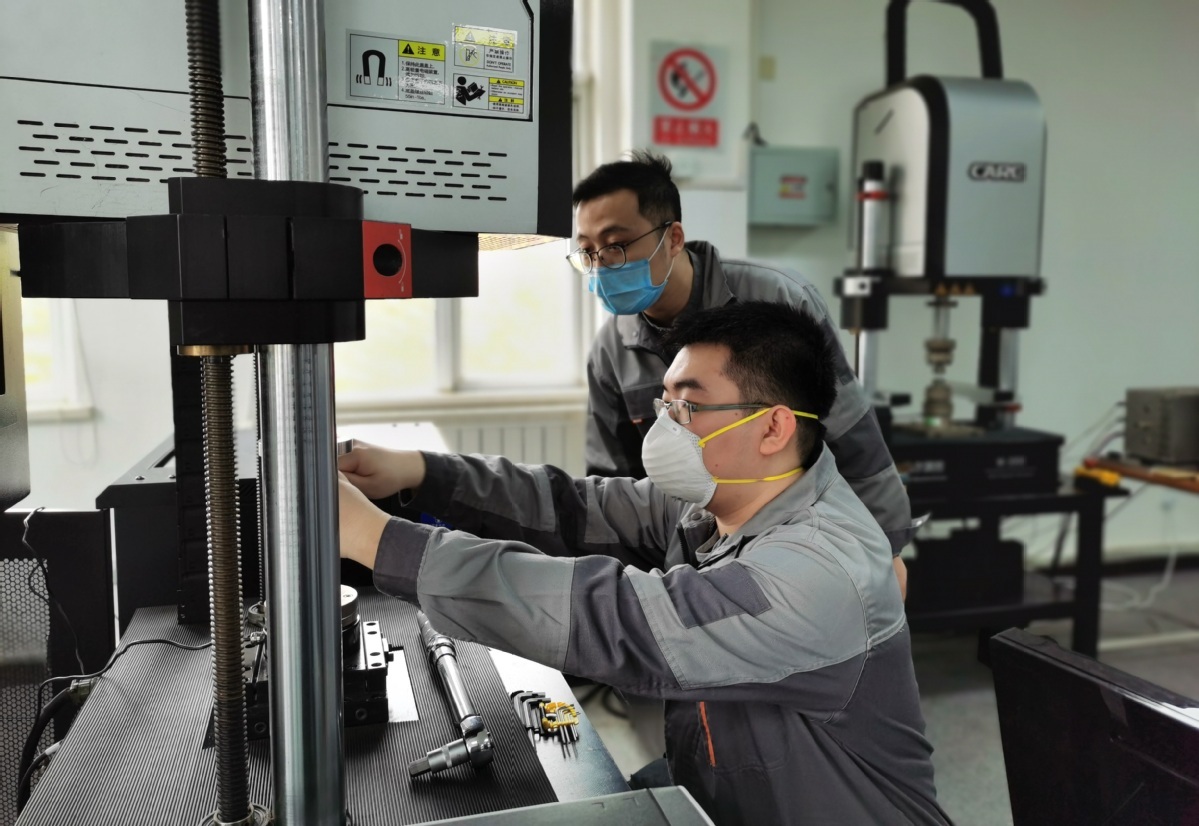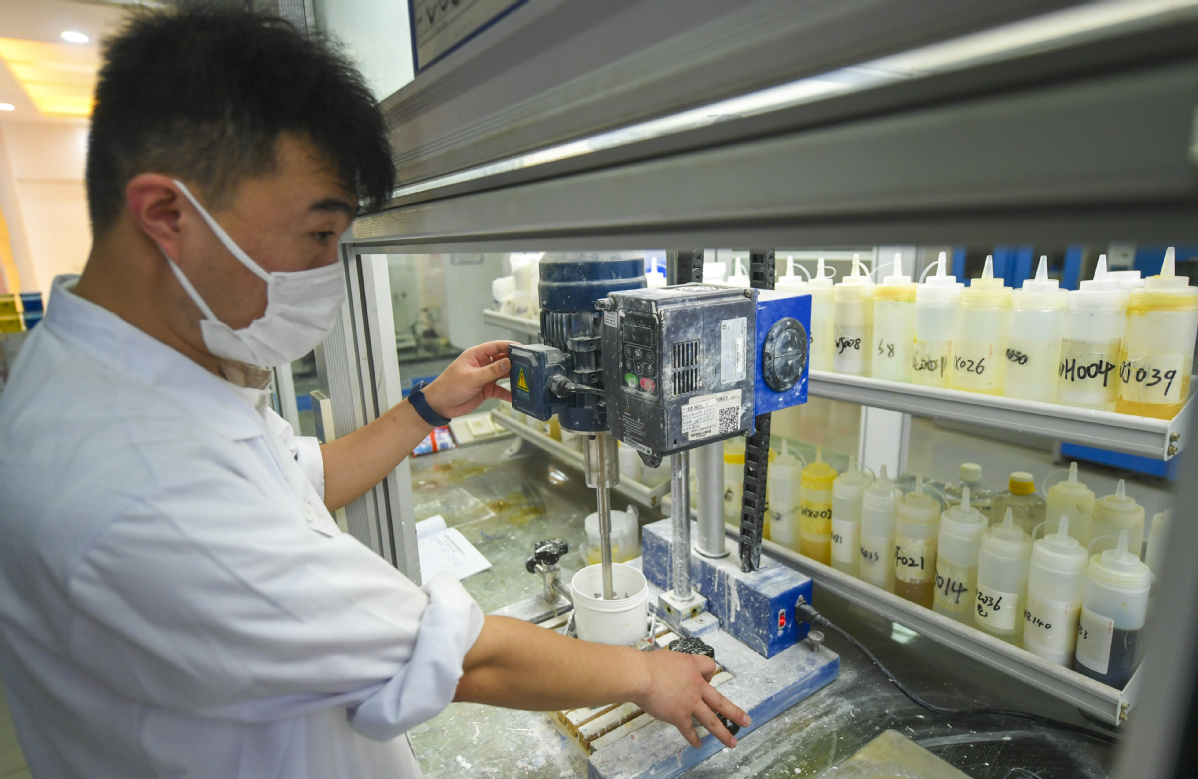
Care Measurement & Control employees check calibration equipment at a workshop in Tianjin. The company is one of the several in the port city that has got financial assistance from the local government. (Photo: Xinhua)
Move will help restore market, investor confidence and reduce COVID-19 epidemic impact on enterprises, say experts
China SME Development Fund Co Ltd was recently set up in Shanghai, with 15 national ministries, State-owned business giants and leading companies in various fields holding stakes.
With a total registered capital of 35.75 billion yuan ($5.1 billion) for the company, China's Ministry of Finance, for the first time, directly serves as an LP, or limited partner, with a 42.66 percent stake worth 15.25 billion yuan.
China Tobacco, State-owned investment firm Guosheng Group, China Life Insurance, People's Insurance Company of China, Minsheng Royal Asset Management and Shanghai ICY Capital are also among the investors.
The opening of the company marked the official operation of the National SME Development Fund, the country's special financial platform to support small and medium-sized enterprises. It also marked the birth of one of China's largest fund-of-funds this year.
A fund-of-funds is an investment strategy that holds a portfolio of other investment funds rather than investing directly in stocks, bonds or other securities.
Experts and industry insiders said that the move will restore market and investor confidence and help SMEs resume production and withstand difficulties due to the COVID-19 epidemic, and in the long term, promote sustainable growth of SMEs in key sectors.
"The establishment of the fund is part of the country's efforts to promote innovation and transformation of SMEs as well as the nation's high-quality economic development," said Wang Jiangping, vice-minister from the Ministry of Industry and Information Technology-the operator of the fund.
"The fund will fully leverage the multiplier effect of central fiscal funds to play an important role in cultivating new business formats, new models, new growth and new momentum," Wang said.
The China SME Development Fund Co Ltd said the size of the fund is also expected to further expand to 100 billion yuan through setting up several sub-funds in partnership with private capital firms in the country.
"The long-term development of technological innovation and mass entrepreneurial activities is inseparable from the support of early-stage venture capital and private equity capital firms," said Sheng Xitai, founder and chairman of Hongtai Aplus, a full-cycle investment firm with notable investments in over 50 technology firms.
Sheng said that as technological innovation is centered around large-scale investment, long cycles and high risk, it is difficult to rely solely on the development and cultivation of the industry's own operating income.
"Private equity investment and venture capital funds can connect money with technological innovation companies in a more effective and targeted way and become their important capital suppliers," Sheng added.
China set up the National SME Development Fund in September 2015 to support growing SMEs in the seed and early stages. With the first batch of capital hitting 60 billion yuan, the fund called for the joint participation of private and State-owned enterprises, financial institutions, as well as local governments.
After that, the fund has successively launched four limited partnership sub-funds, including Shenzhen Guozhong Venture Capital Management Co Ltd, Jiangsu province-based Addor Capital, Oriental Fortune Capital and THG Ventures-a venture capital firm backed by Tsinghua Holdings.
So far, the fund has invested in more than 100 start-ups in a consortium of emerging industries, which include online taxation service platform Huisuanzhang, business data solution firm Tianyancha, and e-signature software provider Esign.
"The National SME Development Fund has adopted an innovative mode that interconnects both parent fund and sub-fund. It not only exerts the synergistic linkage effect between the two kinds of funds but can also attract the participation of diversified social capital to maximize the effect," said You Jinbai, president and co-founder of Addor Capital.
You noted that the fund will play a critical role in helping SMEs to endure the impact brought by COVID-19. Due to the unexpected outbreak, many SMEs are finding it harder to raise funds and resume normal operations.
Wang Xiaolu, with the National Economic Research Institute, said: "SMEs are the main driving force of the country's productivity and the main stabilizer for employment and the industrial chain. Supporting SMEs is crucial in reducing vulnerability and ensuring a steady economic recovery in the coming months."

A technician conducts experiments at an R&D center in Yongqing, Hebei province. Yongqing has been promoting innovation of firms for some time. (Photo: Xinhua)
Currently in China, the private economy is an indispensable force behind the country's development. Private companies contribute 60 percent of China's GDP, and are responsible for 70 percent of innovation, 80 percent of urban employment and provide 90 percent of new jobs.
Since the contagion outbreak, China has launched a series of measures to support SMEs. In July, the ministry, together with other 16 ministries, launched a guideline to improve supportive rules for SMEs.
The measures included improving the incentive and exit mechanism of venture capital firms and guiding angel investors, private equity and venture capital investors to expand equity financing of SMEs. The guideline also called for efforts to support more high-quality SMEs to list on the capital market.
According to the China Association of Small and Medium Enterprises, the SME development index rose 3.5 points to 85.5 in the second quarter. Among the SMEs surveyed, enterprises in the industrial sector had the best performance in work resumption, with a resumption rate of 93.17 percent.
SMEs' confidence has also been boosted. The macroeconomic perception index, which reflects corporate confidence, was now 99.3, an increase of 4 points from the first quarter. The comprehensive business index was 93.7, up 4.5 points from the previous quarter.
"For SMEs, what the National SME Development Fund offers is more than just funds," said Luo Zhuo, founding partner of THG Ventures, a venture capital firm backed by Tsinghua Holdings. "The brand endorsement effect and resources behind the fund may even be as important as the funds themselves."
As one of the sub-fund managing firms, Luo said that the company has striven to maintain close contact with invested companies in talent introduction, research and development cooperation and upstream and downstream connection.
Invispower, a Chinese wireless charging solutions provider, launched its latest electric vehicle charging solutions recently. As the core technology was developed by a group led by Tsinghua University, THG Ventures has played a role in linking the two sides.
In addition, Invispower also set up a new smart manufacturing base in Nantong, Jiangsu province, which is able to produce 4 million wireless charging chipsets per year.
"Compared with common funds, the new national fund places a special focus on key emerging sectors including high-end equipment manufacturing, new energy, new materials and biomedicine, energy conservation, environmental protection and information technology," Luo said.
With more and more private capital pouring in, Xiao Qun-partner of Shenzhen-based Oriental Fortune Capital-added that the total size of the sub-funds is expected to reach 150 billion yuan, and 60 percent of them, representing some 90 billion yuan, will be directly invested in SMEs.


